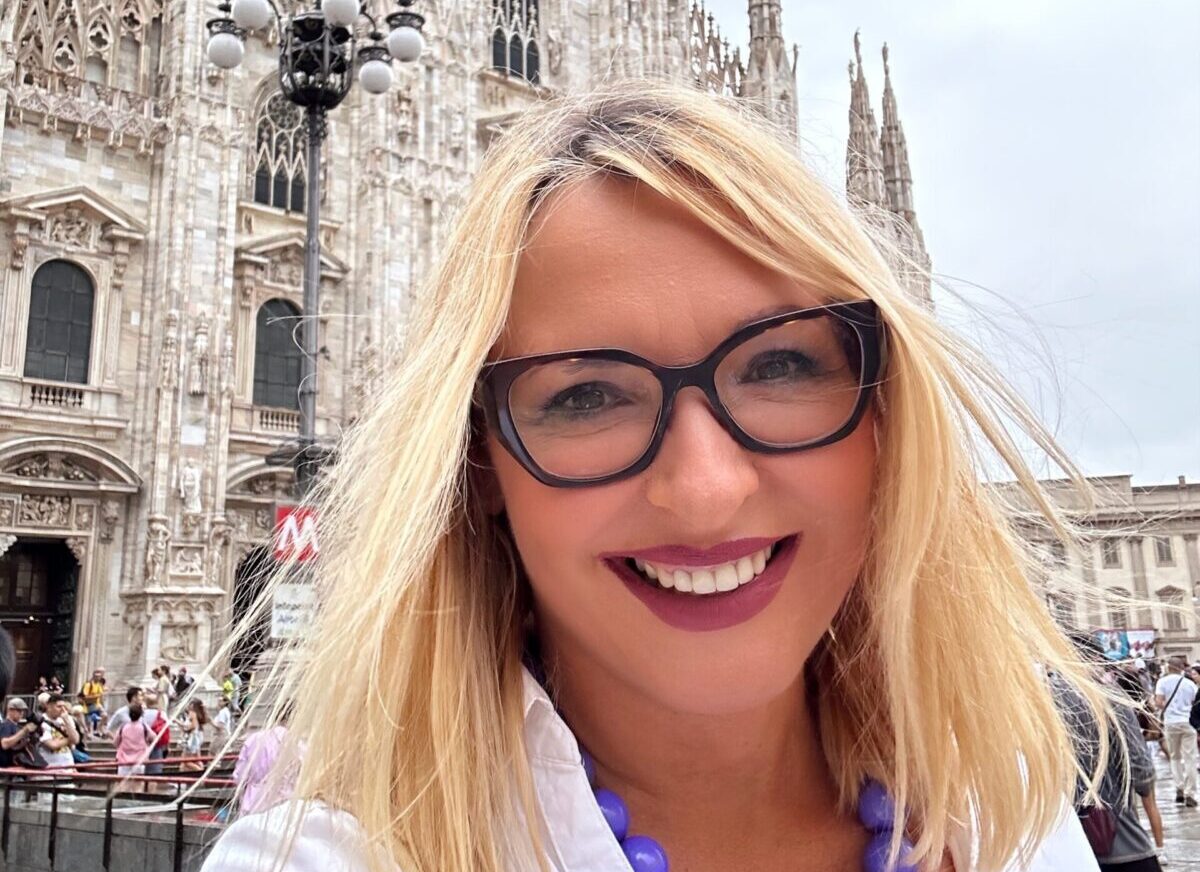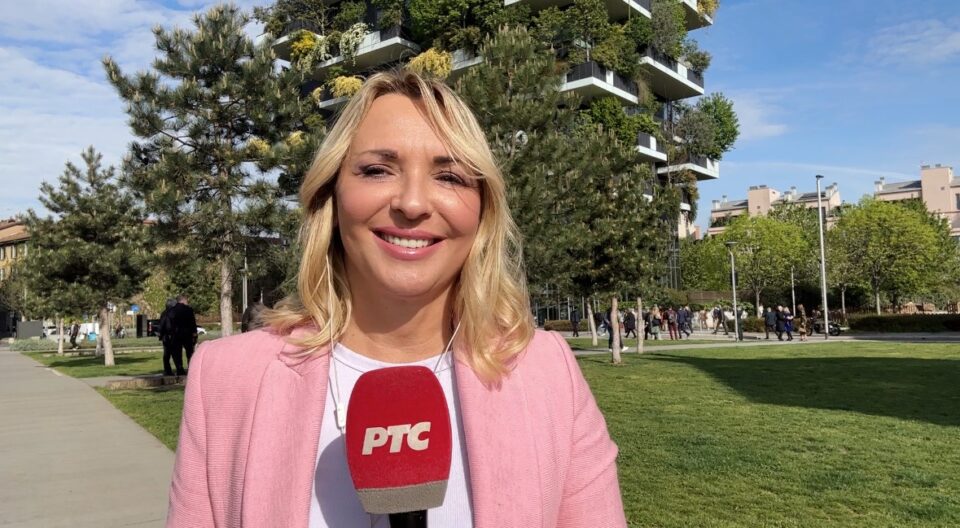You can call yourself a journalist only when you present the facts without taking sides

A native of Belgrade who started her career at Golf Radio with the famous Gorica Nešović ended up as a presenter at Radio Populare in Milan. From 2020 she has worked as an RTS correspondent from Milan, where she lives, and from where she regularly informs us about all the interesting happenings in northern Italy.
You started your career on the radio and today you work on television and you work abroad. How difficult were those changes for you?
I call them challenges. I approached everything with enthusiasm because that is something that characterizes me as a person – enthusiasm and optimism – and when you do something you love nothing is really that difficult. You look forward to those challenges. I could not imagine doing something other than journalism, which is quite a difficult challenge when you are abroad and the instrument of your work is a language that is not your mother tongue. But I was persistent, I tried and I succeeded.
What are the differences between radio and television journalists?
Radio is about voice and by that I don’t mean only words and what is being talked about, but also the way something is pronounced, what is your rhythm, tone, colour, and all that non-verbal communication that exists within verbal communication. When I came to Italy, I was amazed by the fact that they shout on the radio, that it doesn’t matter to them whether someone has a beautiful voice or not or a speech impediment. It seemed as if anyone could do that job. Today, commercial radio stations have influencers who bring them listeners – if you have a lot of followers, you will have an opportunity to work on the radio. I think that’s a completely wrong approach.
Television is not only about voice – there is the whole appearance of the person who conveys the information to you and everything affects how that information will be conveyed – the studio, your clothes, hair colour, smile, tone, the way you read the news, gestures… We actually communicate non-stop without even realizing it. I started my career on radio in Serbia and in Italy, I worked on radio for almost 20 years. Television is also something I found myself in. Today, many people recognize me first by my voice and then by my appearance, because many TV reports don’t feature the journalist’s face, as is also the case with me.
What are the differences between working in Serbia and Italy?
It is difficult for me to compare my work in the Serbian media during the difficult period in the 1990s when I was very young with my somewhat more mature years in Italy which felt like a rebirth. I learned everything from scratch because language is my main instrument, so I had to master it well in order to be able to knock on some doors at all. Working in the media saved me in Serbia because I had contact with people when the whole world closed its doors to us. The Italian public service RAI is very similar to Radio and Television of Serbia (RTS). Other commercial television states, like Mediaset created by Silvio Berlusconi, feature both good and trash programmes. The division between left and right is very visible, so depending on which newspaper you read, you are immediately placed on one side or the other. As a journalist, I read and follow everything, and I am grateful for the fact that I can follow media from the Balkans, but also those in English, so I can form a more complete picture. As a journalist, I seek to get to the source and hear or see for myself what I am going to talk about. There is a lot of copy-paste in journalism today.
People follow the news selectively, i.e. the news that is in line with their beliefs
You became known to a wider audience in Serbia during the pandemic when the north of Italy suffered the terrible consequences of COVID-19. How difficult was that period for you personally and professionally considering the horrible stories you had to report about?
During that period, especially at the beginning of the pandemic, I received several messages through social networks accusing me of spreading unwanted panic. I also received quite a few insults, but when you do this job, it’s up to you to say what’s going on, regardless of what you think about a situation. Your task is not to give your personal judgment but to present the information available to you, that is all the information, and then the audience will make their judgment and form their own opinion. I got through the pandemic quite easily, again maybe because of my spirit and the fact that, unlike the Italians, I already had experience with dramatic situations living in Belgrade until 2000. We, as a nation, have been through a lot, and so have I in my personal life. I went through some things that many people don’t go through in five lifetimes. During the pandemic, I had the opportunity as a journalist to go to places that no one could access. I saw the empty Venice, I was completely alone in St. Mark’s Square and Piazza Duomo. These are things I will never forget.
You also covered Siniša Mihajlović’s passing. We saw how Italy gave him a magnificent sendoff. How much was our football legend responsible for connecting Serbia and Italy?
In Italy, I often hear the question “How come you, a small nation and there aren’t many of you, have so many excellent athletes”? When Siniša passed away, I spoke with one of his best friends, who is also the editor of Gazzetta dello Sport and the author of his biography. He told me: “You understand that character of yours. You have that something decisive, brash, direct, so people either love you or they don’t.” Siniša was much loved precisely for that reason. He was honest. Everyone was shocked when he died because, even though he had been ill for a long time, when it comes to people like him, you think they are immortal. The funeral was so moving with so many different fans, clubs and ordinary Italians attending. There was even the Yugoslav flag. Siniša, as well as other athletes, certainly played the role of our country’s ambassador, which is very important because many Italians still do not know us well enough and have a distorted opinion based simply on ignorance.
You live and work in a European Union country, but your employer is a public media service from Serbia. Are you familiar with the current situation in the media in our country and what do you think about it?
I follow the events in Italy very closely so that I can properly report about them to viewers in Serbia. I simply do not have time to follow in detail everything that is happening in the media in our country. I think that the situation is quite similar everywhere and that the Internet is partly to blame. Thanks to various platforms we can watch whatever we want or think is right or whatever broadcast we like to hear. People follow the news selectively, i.e. the news that is in line with their beliefs. Journalists here, in Italy and actually everywhere in the world are to blame for that. You have to understand that journalists also depend on publishers who are backed by a certain party option or even a mafia. Everything is very complicated. As for me, I worked in Italy for 18 years at a radio that is perceived as the left option and calls itself independent and a priori believes that everything the left thinks and says is correct. But it is not correct or true and that applies to both the left and the right. You can call yourself a journalist only when you present the facts without taking sides. You can’t call yourself independent, but only a journalist, because a journalist, by the very definition of the profession, must be independent. I have had such a relationship with RTS since day one.
There is too much violence everywhere. In Italy, we have a huge number of femicides, violence among migrants, baby gangs… Violence is growing across the entire society not only in this country. The pandemic and the distance between people have left serious consequences on the psyche, which are manifested in this way. There is also globalization and the dissolution of the values that have been our pillar of support until now. All of this causes fragmentation in society, which can be seen in all segments. Everyone is disoriented.
You can’t even believe your eyes because you don’t know if what you’re looking at is real or artificial
Neither Italy nor other EU countries have been spared attacks and pressures on journalists and independent media, but it seems that the political system in Italy at least protects them, while here it is the main opponent. Why is it so?
I think that we, in our country, have this idyllic view of the EU and we have the idea that everything here works perfectly and that everything is in its place. I often talk about it with Italians, who like to say a sentence that I often hear in our country, which is: “This can only happen in a failed country like ours” or “This can only happen in Italy” and the like. I think it’s like that everywhere, more or less. I often talk to my fellow journalists, both Italian and correspondents from the rest of the world working in Italy, about whether journalism is still free. We asked ourselves that a lot during the pandemic. I had the impression that my colleagues had forgotten what our profession really meant. Everything became polarized – either you are for or you are against, you are in favour or against vaccination, or you are a supporter of a conspiracy theory or not. We witnessed terrible scenes on television, individuals being attacked by groups, quarrels, shouting, demonstrative walkouts from the studio… Public guillotine of the one who thinks for himself and news that clearly favours one side, whether it’s about the war between Russia and Ukraine, or other things. There is no presentation of facts on both sides. This must not happen in journalism, which is very divided here basically between the right and the left, while the pandemic caused even bigger divisions.
What do you think about using artificial intelligence in journalism? Does it represent a threat to our profession and society as a whole or can it be a useful tool?
Our profession has long been threatened because newspaper circulation figures have been constantly dropping and people are, as the Italians would call them, Tuttologi – derived from the word “tutto” which means “everything”. In translation, everyone knows everything about everything. And they don’t trust anyone anymore. There is a lot of incorrect information circulating and photos that have been altered. Every amateur today presents information and no one believes anything anymore. You can’t even believe your eyes because you don’t know if what you’re looking at is real or artificial. Artificial intelligence scares people because it can write a text, duplicate your voice and even make a programme using your voice. The use of humanoid robots is growing so there is a fear of it not only in our profession but also in many others. We shouldn’t be surprised that AI appeared. We expect it to happen but there are still no norms and provisions in place that can stop it and put it in the right context. Like everything in life, it certainly depends on how and to what extent it will be used.
